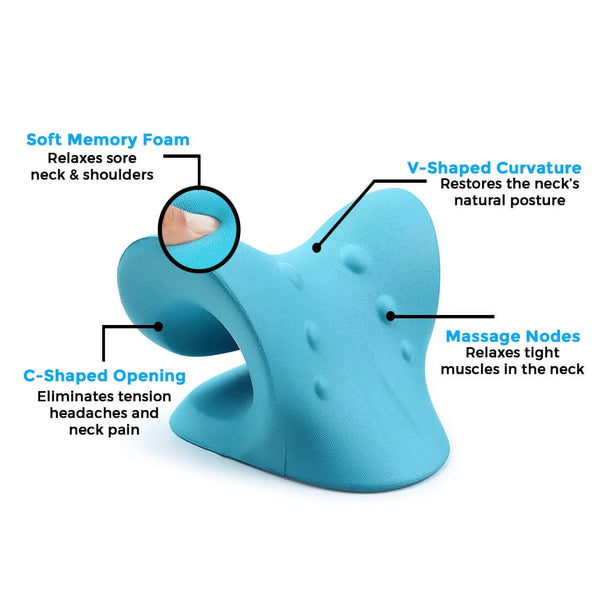Neck Cloud: Ergonomic Design for Maximum Convenience and Pain Decrease
The Influence of Tension on Neck Discomfort: Methods for Decreasing Stress and Pain
In today's busy globe, it's clear that anxiety has actually become a common variable in the start and exacerbation of neck pain. The detailed relationship in between anxiety and muscle tension often leaves individuals looking for remedy for the pain that takes place. By discovering targeted techniques focused on reducing tension and promoting relaxation, one can start to resolve the origin causes of neck pain and work towards an extra balanced state of wellness. Join us on a trip to unwind the effect of stress and anxiety on neck discomfort and uncover effective methods to ease discomfort and improve general lifestyle.
Comprehending Stress-Related Neck Pain
Stress-related neck discomfort can manifest as tension, rigidity, or discomfort in the neck and shoulder location. The link between anxiety and neck discomfort exists in the body's physical response to stress, which can result in muscle mass tension and tightness in the neck muscular tissues.

Identifying Common Tension Locations
Frequently experienced by individuals under stress and anxiety, stress areas in the body can offer important understandings right into the physical symptoms of emotional strain. One typical tension area is the neck, where tension typically materializes physically. Tension migraines, rigid neck muscle mass, and limited variety of activity are typical symptoms of stress-related neck stress. The shoulders are another usual area where tension collects. Stress can cause the muscles in the shoulders to tighten up, causing discomfort and pain. Furthermore, the top back is vulnerable to tension accumulation, specifically in people that experience chronic tension. Poor stance and prolonged resting can aggravate stress around. The jaw is additionally a typical place for stress-related stress, as lots of people clench their jaw or grind their teeth when stressed. Being conscious of these typical stress areas can assist people acknowledge the physical indications of anxiety and take actions to address them before they intensify into chronic pain or discomfort.
Executing Leisure Strategies
Relaxation techniques are valuable tools for minimizing neck pain triggered by stress. In addition, activities like yoga and tai chi integrate both physical activity and relaxation, making them reliable techniques for lowering stress and neck discomfort. By including these relaxation methods right into your everyday routine, you can aid manage stress and anxiety degrees, lower tension in the neck, and ease pain connected with stress-induced neck discomfort.
Including Self-Care Practices
Including self-care practices is vital for maintaining general wellness and handling stress-related neck pain effectively. Participating in regular exercise, such as mild extending exercises or yoga, can aid minimize tension in the neck and shoulders. Practicing great position throughout the day and taking regular breaks from extended sitting or screen time can likewise prevent pressure on the neck muscular tissues.
Additionally, prioritizing adequate rest and establishing a regular rest routine can contribute considerably to minimizing stress levels and advertising relaxation. Producing a soothing bedtime routine, such as reviewing a publication or taking a click for more warm bath, can aid prepare the body and mind for peaceful rest. In addition, preserving a well balanced diet regimen abundant in nutrients and remaining hydrated can support total health and reduce swelling that might exacerbate neck pain.
Including mindfulness methods, such as deep breathing exercises or meditation, can help handle tension and promote relaxation. Taking time for oneself, engaging in leisure activities, and setting boundaries to protect personal time are also important elements of self-care that can add to reducing stress and anxiety and easing neck discomfort.
Seeking Professional Assistance
Just how can individuals successfully deal with relentless neck pain that is influencing their life and well-being? Seeking specialist assistance can be an important step in managing and reducing neck pain. Consulting with health care experts such as chiropractors, physiotherapists, or orthopedic experts can provide useful insights and customized treatment plans. These specialists can perform extensive assessments to diagnose the underlying reasons for neck discomfort and advise appropriate treatments.
Chiropractic doctors concentrate on back adjustment techniques to boost next page positioning and decrease tension in the neck area. Physiotherapists offer targeted stretches and workouts to reinforce muscles, improve flexibility, and improve total neck feature. Orthopedic experts can give sophisticated medical interventions such as injections or medical choices for severe situations of neck pain.
Verdict

Stress-related neck pain can show up as stress, rigidity, or pain in the neck and shoulder area. The connection in between stress and anxiety and neck discomfort exists in the body's physiological reaction to stress, which can result in muscle stress and rigidity in the neck muscular tissues. Stress headaches, tight neck muscle mass, and restricted variety of movement are common signs of dig this stress-related neck tension. By incorporating these leisure methods into your everyday routine, you can aid manage stress and anxiety levels, minimize stress in the neck, and minimize discomfort associated with stress-induced neck pain.
